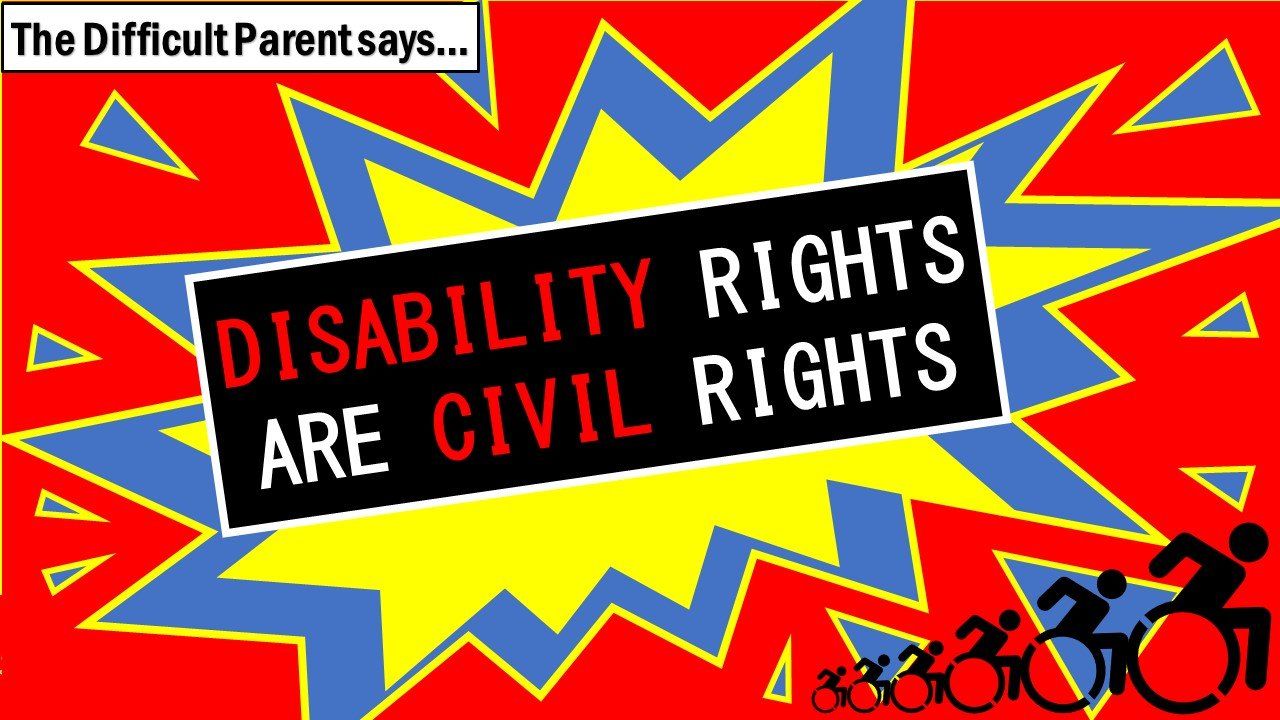Making a MOCKERY of their Learning Review, Haringey SEND transport says it has NO DUTY to provide transport if YOU choose your child's school
- By Brian Leveson
- •
- 05 Apr, 2022
- •
Making a mockery of the SEND transport learning review and driving disadvantages and education inequalities for children with special educational needs and disabilities (SEND) and their families, the Haringey Local Offer appears to contradict the statutory guidance that says it must provide assistance to eligible children.

Quick reminder about what the point of SEND transport is...
The Department for Education says For [SEND transport] arrangements to be suitable, they must
also be safe and reasonably stress free, to enable the child to arrive at school ready for a
day of study
and this is to be provided for all eligible children.
Despite what Haringey say, this might include if you choose to send your child to a school that the council does not consider to be the nearest suitable school.
Despite what Haringey say, this might include if you choose to send your child to a school that the council does not consider to be the nearest suitable school.
Deliberately misinforming parents?
For reasons that I cannot fathom, other than to deliberately misinform parents and put them off applying, the Haringey website says "If you choose to send your child to a school that the council does not consider to be the nearest suitable school, the council has no duty to provide free transport. In such circumstances, parents will be required to make their own transport arrangements."
However, the Department for Education " Home to school travel and transport" statutory guidance says that they must help eligible children. Including children with SEND in which case usual transport requirements (e.g. the statutory walking distances) should not be considered when assessing the transport needs of children eligible due to SEN and/or disability
https://assets.publishing.service.gov.uk/government/uploads/system/uploads/attachment_data/file/5753...
However, the Department for Education " Home to school travel and transport" statutory guidance says that they must help eligible children. Including children with SEND in which case usual transport requirements (e.g. the statutory walking distances) should not be considered when assessing the transport needs of children eligible due to SEN and/or disability
https://assets.publishing.service.gov.uk/government/uploads/system/uploads/attachment_data/file/5753...

Cerebra's "School Transport in England - a guide for parents"
The most comprehensive guide to this that we have read is by Cerebra, a national charity helping children with brain conditions and their families.
As Cerebra explain' on its website: This guide explains the legal obligations on local authorities to provide free school transport for disabled children in England. Our aim is to help parents and carers understand their legal rights, but this guide is not intended to be legal advice and it should not be relied on as such. The law relating to school transport can be complicated and you may need to take independent legal advice to find out how the law applies to your particular circumstances.
***Cerebra's guide also contains a TEMPLATE LETTER you can use to challenge the local authority***
https://cerebra.org.uk/download/school-transport-in-england/
As Cerebra explain' on its website: This guide explains the legal obligations on local authorities to provide free school transport for disabled children in England. Our aim is to help parents and carers understand their legal rights, but this guide is not intended to be legal advice and it should not be relied on as such. The law relating to school transport can be complicated and you may need to take independent legal advice to find out how the law applies to your particular circumstances.
***Cerebra's guide also contains a TEMPLATE LETTER you can use to challenge the local authority***
https://cerebra.org.uk/download/school-transport-in-england/
How the Difficult Parent rates this...
Difficult Parent considers this to be misinformation through omission of vital information about the eligibility of children
for transport assistance and makes a mockery of the SEND Transport Learning Review, which had the following FIRST recommendation:
Robust communications plan with key information and regular updates provided to parents, carers,
schools and providers regarding policy and processes. Communication should be in a range of
formats including, single messaging on social media, SEND newsletter, FAQ sessions at schools,
drop in sessions for staff, providers/ summer sessions for parents and/or webinar guide on local
offer.
https://www.haringey.gov.uk/sites/haringeygovuk/files/send_transport_learning_review_key_headlines_d...
https://www.haringey.gov.uk/sites/haringeygovuk/files/send_transport_learning_review_key_headlines_d...
A driver of inequalities in Education and Employment
The Haringey Borough Plan promises to address inequalities and that the council will ensure that equality is promoted, and
inequality reduced, in our policies, and the way we provide
services.
For children with special educational needs and disabilities
By not providing the right information in the right place the council are driving educational inequalities for SEND children who may not get the support to get to school ready to learn.
Economic Wellbeing – All residents are "we will get as many people into work and financially independent as we can, whatever their backgrounds, removing the barriers to employment which some residents face"
Putting parents off applying from SEND transport might prevent parent carers applying for jobs or staying in work because they need to accompany a disabled child to school, for example.
BOROUGH PLAN 2019 – 2023 https://www.haringey.gov.uk/sites/haringeygovuk/files/borough_plan_2019-23.pdf
For children with special educational needs and disabilities
- The plan promises a happy childhood for all children, and to support children with special educational needs and disabilities.
- The council will "work with parents and carers to try to remove the barriers which some children face in achieving their full potential"
By not providing the right information in the right place the council are driving educational inequalities for SEND children who may not get the support to get to school ready to learn.
Economic Wellbeing – All residents are "we will get as many people into work and financially independent as we can, whatever their backgrounds, removing the barriers to employment which some residents face"
Putting parents off applying from SEND transport might prevent parent carers applying for jobs or staying in work because they need to accompany a disabled child to school, for example.
BOROUGH PLAN 2019 – 2023 https://www.haringey.gov.uk/sites/haringeygovuk/files/borough_plan_2019-23.pdf


What can YOU do if this happens to YOU?
1. Read the statutory guidance - see below for extracts on Eligible Children
https://assets.publishing.service.gov.uk/government/uploads/system/uploads/attachment_data/file/5753...
2. Get help and advice from SENTAS
https://sentas.co.uk/ - read their 'Transport Myths' page
3. Read the guide from Cerebra
https://cerebra.org.uk/download/school-transport-in-england/
***Cerebra's guide also contains a TEMPLATE LETTER you can use to challenge the local authority***
4. Get help and advice from SENDIASS
https://markfield.org.uk/sendiass-2/
5. Contact a national charity help line
ACE Education
Independent advice and information for parents on education issues in England.
http://www.ace-ed.org.uk/advice-abouteducation-for-parents
Helpline: 0300 0115 142
Contact (formerly Contact a Family)
A national charity for families with disabled children.
https://contact.org.uk/advice-and-support/ education-health-social-care/education/
Freephone Helpline: 0808 808 3555
Coram Children’s Legal Centre
Provides specialist advice and information on child, family and education law.
http://childlawadvice.org.uk
Education law helpline: 0300 330 5485
IPSEA
A national charity offering information/advice on special educational needs.
https://www.ipsea.org.uk
Advice line appointments: https://www.ipsea.org.uk/advice-line
SOS!SEN
A national charity offering information/advice on special educational needs.
http://www.sossen.org.uk
Helpline: 020 8538 3731
https://assets.publishing.service.gov.uk/government/uploads/system/uploads/attachment_data/file/5753...
2. Get help and advice from SENTAS
https://sentas.co.uk/ - read their 'Transport Myths' page
3. Read the guide from Cerebra
https://cerebra.org.uk/download/school-transport-in-england/
***Cerebra's guide also contains a TEMPLATE LETTER you can use to challenge the local authority***
4. Get help and advice from SENDIASS
https://markfield.org.uk/sendiass-2/
5. Contact a national charity help line
ACE Education
Independent advice and information for parents on education issues in England.
http://www.ace-ed.org.uk/advice-abouteducation-for-parents
Helpline: 0300 0115 142
Contact (formerly Contact a Family)
A national charity for families with disabled children.
https://contact.org.uk/advice-and-support/ education-health-social-care/education/
Freephone Helpline: 0808 808 3555
Coram Children’s Legal Centre
Provides specialist advice and information on child, family and education law.
http://childlawadvice.org.uk
Education law helpline: 0300 330 5485
IPSEA
A national charity offering information/advice on special educational needs.
https://www.ipsea.org.uk
Advice line appointments: https://www.ipsea.org.uk/advice-line
SOS!SEN
A national charity offering information/advice on special educational needs.
http://www.sossen.org.uk
Helpline: 020 8538 3731
What the statutory guidance says...
Statutory Guidance say's local authorities MUST make transport arrangements for all eligible children
Section 508B ofthe
Education Act 1996 deals with the duty on local authorities to make such
travel arrangements as they consider necessary to facilitate attendance at school for eligible children.
Schedule 35B of the Act defines eligible children – those categories of
children of compulsory school age (5-16) in an authority’s area for whom free travel
arrangements will be required...
Statutory walking distances eligibility
... local authorities are required to provide free transport for all pupils of compulsory school age (5-16) if their
nearest suitable school* is:
* Taken to mean the nearest qualifying school** with places available that provides education appropriate to the age, ability and aptitude of the child, and any SEN that the child may have
** Qualifying schools are: community, foundation or voluntary schools; community or foundation special schools; non-maintained special schools; pupil referral units; maintained nursery schools; or city technology colleges (CTC), city colleges for the technology of the arts (CCTA) or academies, including free schools and University Technical Colleges (UTC). For children with SEN, an independent school can also be a qualifying school where this is named on the child’s Education, Health and Care Plan (EHC Plan) or statement, or it is the nearest of two or more schools named.
- beyond 2 miles (if below the age of 8); or
- beyond 3 miles (if aged between 8 and 16)
* Taken to mean the nearest qualifying school** with places available that provides education appropriate to the age, ability and aptitude of the child, and any SEN that the child may have
** Qualifying schools are: community, foundation or voluntary schools; community or foundation special schools; non-maintained special schools; pupil referral units; maintained nursery schools; or city technology colleges (CTC), city colleges for the technology of the arts (CCTA) or academies, including free schools and University Technical Colleges (UTC). For children with SEN, an independent school can also be a qualifying school where this is named on the child’s Education, Health and Care Plan (EHC Plan) or statement, or it is the nearest of two or more schools named.
Special educational needs, a disability or mobility problems eligibility
...
local authorities are required to make transport arrangements for all children who cannot reasonably be
expected to walk
to school because of their mobility problems or because of
associated health and safety issues related to their special educational needs
(SEN) or disability*.
Eligibility, for such children should be assessed on an
individual basis to identify their particular transport requirements. Usual
transport requirements (e.g. the statutory walking distances) should not be
considered when assessing the transport needs of children eligible due to
SEN and/or disability.
*As per Schedule 35 of The Act, disability is as defined in S.6 of EA 2010: a person has a disability if they have (a) a physical or mental impairment, and (b) that impairment has a substantial a long-term effect on the ability to carry out normal day-to-day activities. Therefore a chronic health condition may lead to eligibility under this definition.
*As per Schedule 35 of The Act, disability is as defined in S.6 of EA 2010: a person has a disability if they have (a) a physical or mental impairment, and (b) that impairment has a substantial a long-term effect on the ability to carry out normal day-to-day activities. Therefore a chronic health condition may lead to eligibility under this definition.
Unsafe route eligibility
...
local authorities are required to make transport arrangements for all children who cannot reasonably be
expected to walk
to nearest suitable school because the nature of the route is
deemed unsafe to walk.*
* Paragraphs 4 and 5 of Schedule 35B
* Paragraphs 4 and 5 of Schedule 35B
Extended rights eligibility
...
local authorities are required to provide free transport where pupils are entitled to free school meals or their
parents are in receipt of maximum Working Tax Credit
*if:
- the nearest suitable school is beyond 2 miles (for children over the age of 8 and under 11);
- the school is between 2 and 6 miles (if aged 11-16 and there are not three or more suitable nearer schools);
- the school is between 2 and 15 miles and is the nearest school preferred on the grounds of religion or belief (aged 11-16).
Accompaniment
In determining whether a child cannot reasonably be expected to walk for the
purposes of ‘special educational needs, a disability or mobility problems eligibility’ or
‘unsafe route eligibility’, the local authority will need to consider whether the child could
reasonably be expected to walk if accompanied
and, if so, whether the child’s parent can
reasonably be expected to accompany the child.
When considering whether a child’s
parent can reasonably be expected to accompany the child on the journey to school a
range of factors may need to be taken into account, such as the age of the child and
whether one would ordinarily expect a child of that age to be accompanied.


Haringey SEND Transport are insisting that a 17 year old minibus with no air conditioning is a suitable vehicle to transport my paraplegic son in this heatwave. The appalling conditions inside the minibus inside the bus is something they knew about last summer, yet they have to date done nothing whatsoever provide a suitable minibus this year nor appropriately mitigate the temperatures inside the minibus.The conditions inside the minibus are so bad that they triggered multiple seizures during the heatwave as my son has epilepsy, which they SEND transport department know about and they also know that they are triggered by heat.It is not just son who is impacted: last year we know of one child who died on Haringey SEND Transport in the summer heatwave and another who had seizures.









